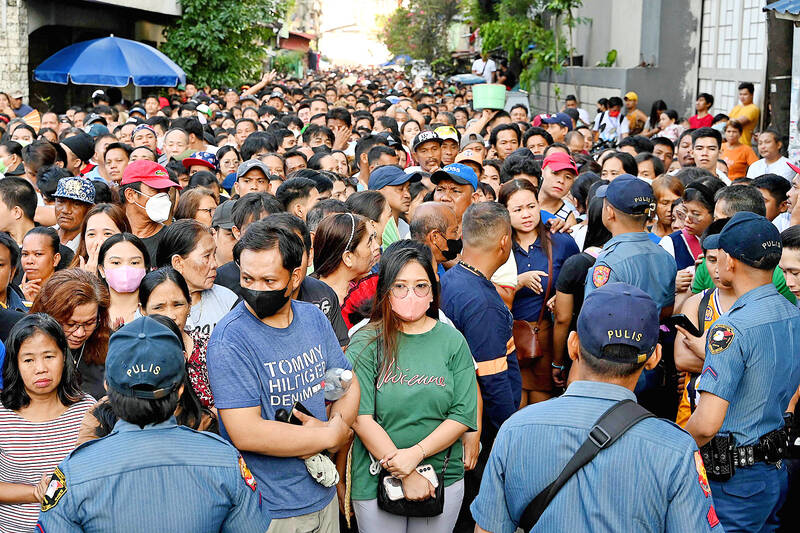At least four people were yesterday killed in the southern Philippines as millions turned out to vote for village leaders following months of deadly poll-related violence.
Security forces were on high alert across the country for the long-delayed nationwide vote for more than 336,000 council positions.
While villages are the lowest-level government unit, the council posts are hotly contested because they are used by political parties to cultivate grassroots networks and build a support base for local and general elections.

Photo: AFP
More than 300,000 police officers and soldiers were deployed to secure polling stations in more than 42,000 villages.
In the capital, Manila, voters waited in long lines to cast their ballots at schools being used as polling venues.
“This is important for the people... We need to be able to consult someone over our problems,” said Rosemarie Garcia in the neighborhood of Tondo. “We need somebody who is easily approachable to his or her constituents.”
Elections are a traditionally volatile time in the Philippines, which has lax gun laws and a violent political culture.
Philippine Commission on Elections Chairman George Garcia said that voting had been “generally peaceful,” except for several incidents on the southern island of Mindanao.
Two people were killed and five were wounded outside a polling station in Maguindanao del Norte province, police said.
The shootout happened during a confrontation between supporters of rival candidates for village captain, said Lieutenant-Colonel Esmail Madin, the police chief of Datu Odin Sinsuat municipality.
In another incident on Mindanao, a woman was killed when a gunfight broke out after a van carrying a village captain and her supporters was stopped on a road by people backing her rival in Lanao del Norte province, the army said.
The husband of a village captain in Lanao del Sur province died after he was shot in the chest during a confrontation with his wife’s rival, police said.
In the run-up to yesterday’s vote, there were 30 confirmed incidents of election-related violence, compared with 35 in 2018, the Philippine National Police said on Sunday, without providing an updated breakdown for the number of dead and injured.
About one-third of the incidents happened in the Bangsamoro Autonomous Region in Muslim Mindanao.
Previous police data showed that eight people were killed and seven injured in poll-related violence between Aug. 28 and Wednesday last week.
More than 67 million people were registered to vote in the elections, which Philippine President Ferdinand Marcos Jr yesterday described as “very important” for higher-level politicians.
“What happens here in the barangay [village] ... are going to have an effect on the results of the mid-term elections and subsequently at the national elections,” Marcos said after casting his vote in his family’s stronghold of Batac City in the northern province of Ilocos Norte.
“If other barangays tell you: ‘I will deliver 350 votes for you in my barangay,’ rest assured, you will get 350. That’s why the result is very important,” he said.

POLITICAL PRISONERS VS DEPORTEES: Venezuela’s prosecutor’s office slammed the call by El Salvador’s leader, accusing him of crimes against humanity Salvadoran President Nayib Bukele on Sunday proposed carrying out a prisoner swap with Venezuela, suggesting he would exchange Venezuelan deportees from the US his government has kept imprisoned for what he called “political prisoners” in Venezuela. In a post on X, directed at Venezuelan President Nicolas Maduro, Bukele listed off a number of family members of high-level opposition figures in Venezuela, journalists and activists detained during the South American government’s electoral crackdown last year. “The only reason they are imprisoned is for having opposed you and your electoral fraud,” he wrote to Maduro. “However, I want to propose a humanitarian agreement that

ECONOMIC WORRIES: The ruling PAP faces voters amid concerns that the city-state faces the possibility of a recession and job losses amid Washington’s tariffs Singapore yesterday finalized contestants for its general election on Saturday next week, with the ruling People’s Action Party (PAP) fielding 32 new candidates in the biggest refresh of the party that has ruled the city-state since independence in 1965. The move follows a pledge by Singaporean Prime Minister Lawrence Wong (黃循財), who took office last year and assumed the PAP leadership, to “bring in new blood, new ideas and new energy” to steer the country of 6 million people. His latest shake-up beats that of predecessors Lee Hsien Loong (李顯龍) and Goh Chok Tong (吳作棟), who replaced 24 and 11 politicians respectively

Young women standing idly around a park in Tokyo’s west suggest that a giant statue of Godzilla is not the only attraction for a record number of foreign tourists. Their faces lit by the cold glow of their phones, the women lining Okubo Park are evidence that sex tourism has developed as a dark flipside to the bustling Kabukicho nightlife district. Increasing numbers of foreign men are flocking to the area after seeing videos on social media. One of the women said that the area near Kabukicho, where Godzilla rumbles and belches smoke atop a cinema, has become a “real

‘WATER WARFARE’: A Pakistani official called India’s suspension of a 65-year-old treaty on the sharing of waters from the Indus River ‘a cowardly, illegal move’ Pakistan yesterday canceled visas for Indian nationals, closed its airspace for all Indian-owned or operated airlines, and suspended all trade with India, including to and from any third country. The retaliatory measures follow India’s decision to suspend visas for Pakistani nationals in the aftermath of a deadly attack by shooters in Kashmir that killed 26 people, mostly tourists. The rare attack on civilians shocked and outraged India and prompted calls for action against their country’s archenemy, Pakistan. New Delhi did not publicly produce evidence connecting the attack to its neighbor, but said it had “cross-border” links to Pakistan. Pakistan denied any connection to